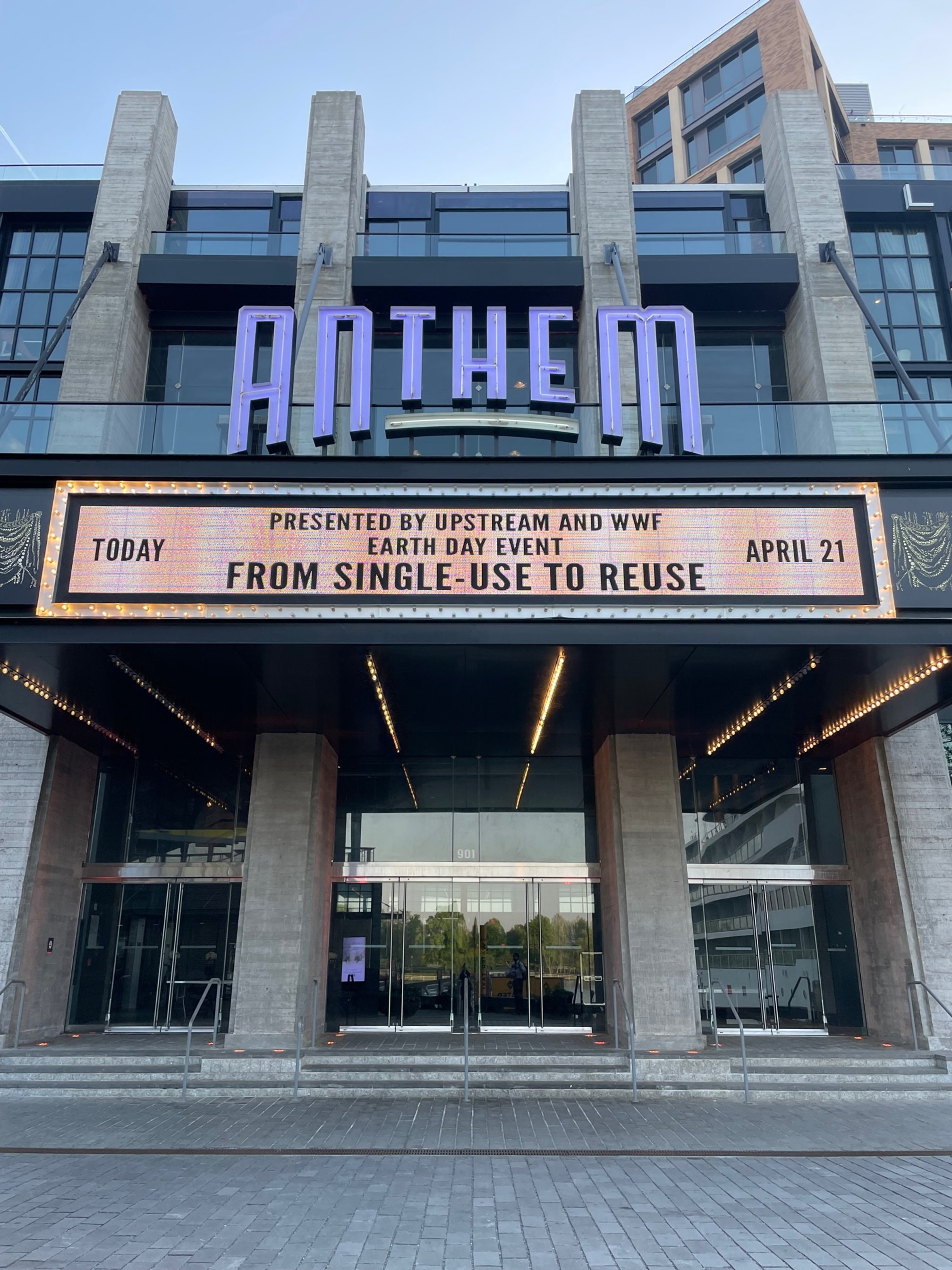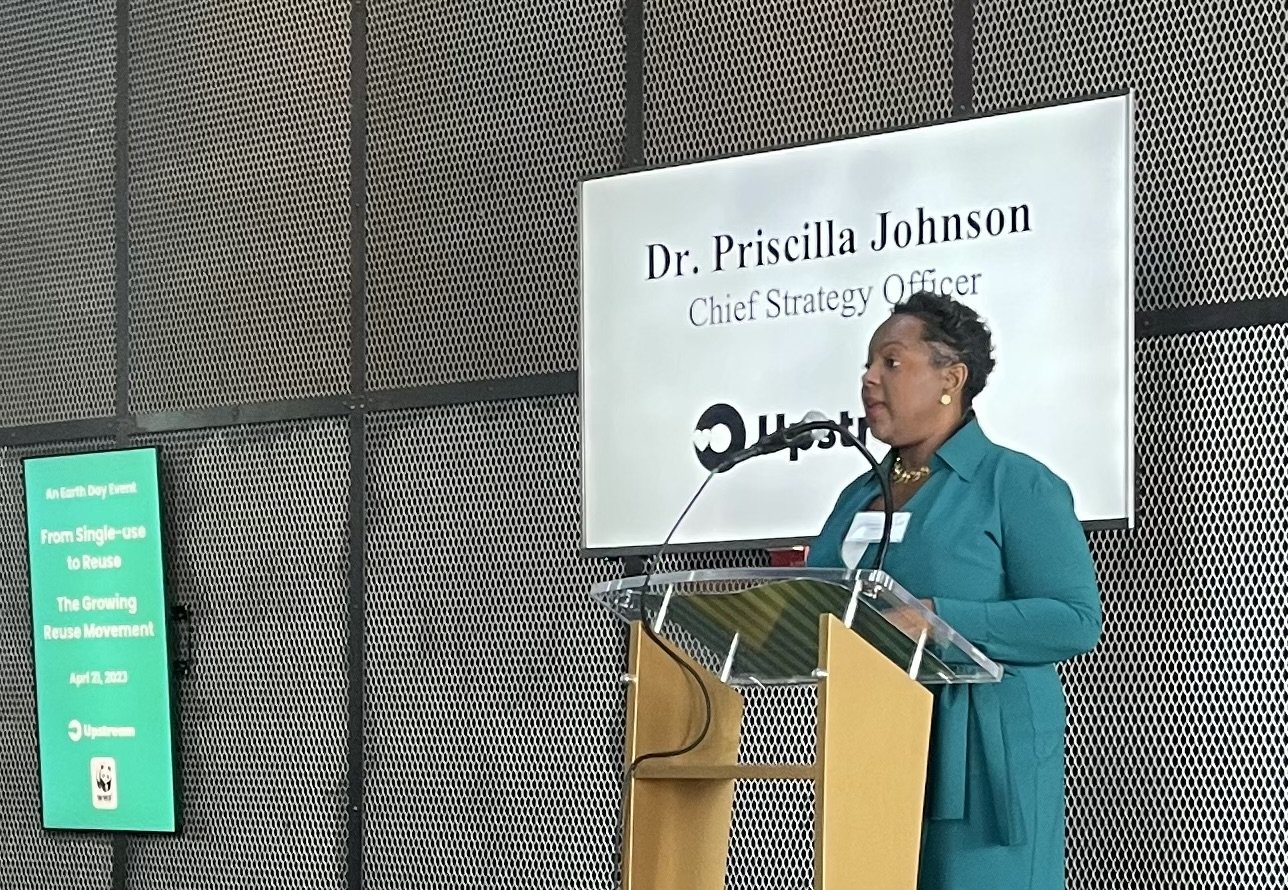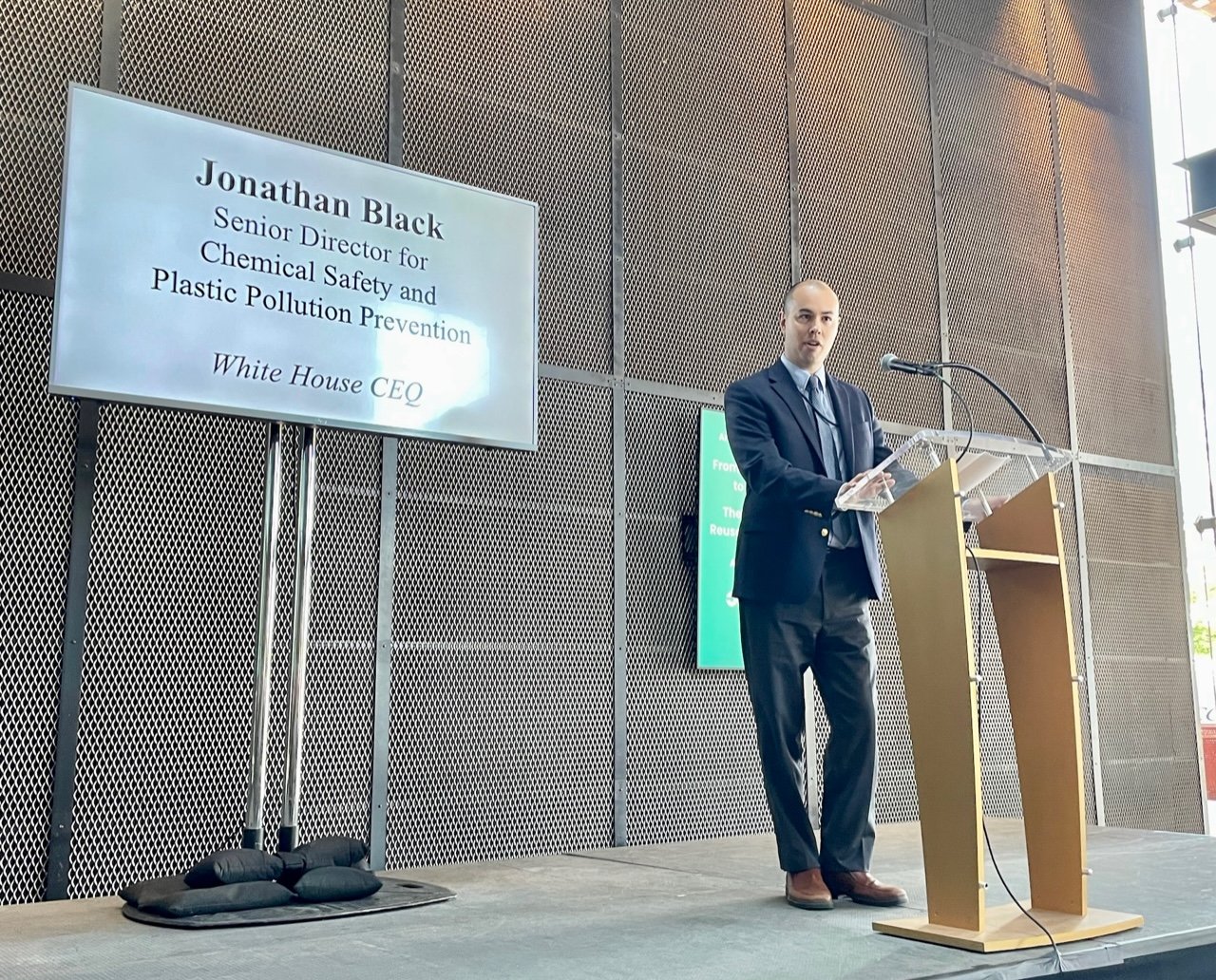An Earth Day event in Washington
From Single-use to Reuse: Earth Day Event Highlights Growing Reuse Movement, with Announcements and Remarks by Federal Government Agencies and Leaders of Reuse Movement
Washington, DC – In celebration of Earth Day, national nonprofit Upstream and World Wildlife Fund (WWF) hosted an event on Friday, April 21, 2023 celebrating the rapid growth and biggest opportunity areas to expand reuse systems in the US to address the global single-use waste crisis. The event featured public announcements and remarks from Federal Government agencies including representatives from the White House Council on Environmental Quality, EPA, Department of Interior, GSA, and NOAA.
With more than 30 cities having reuse directors or initiatives, over 150 reuse companies formed within the last five years, and a growing customer demand, the event highlighted the immense scale of reuse happening on a grassroots level and the potential for the future.
The livestreamed event focused on the different aspects of the reuse movement, including government ambitions, corporate trials, and the impact of single-use waste and benefits of reuse, with the goal to encourage greater awareness and adoption of reuse systems by highlighting reuse’s benefits to climate, decarbonization and public health.
Speakers included:
Erin Simon, Vice President, Plastic Waste and Business, WWF
Dr. Priscilla Johnson, Chief Strategy Officer, Upstream
Trailblazing Cities:
Crystal Dreisbach, CEO, Don't Waste Durham
Christy Chow, Associate, Reuse Seattle
Reuse Innovators:
Michael Martin, Founder and CEO, r.Cup
Lauren Sweeney, Co-Founder/CEO, DeliverZero
Evan Abel, Head of Service Design, The Rounds
Industry Leaders:
Anton Van Zyl, Director of Sustainability, The Coca-Cola Company
Donna Westmoreland, COO, I.M.P. (9:30 Club, The Anthem, The Atlantis, Merriweather Post Pavilion, Lincoln Theatre)
Jessica Synkoski, VP Sustainability and Corporate Social Responsibility, Sodexo
Reuse Investors:
Kate Daly, Managing Director and Head of the Center for the Circular Economy, Closed Loop Partners
Dan Fishman, Partner, Regeneration VC
Federal Government:
Jonathan Black, Senior Director for Chemical Safety and Plastic Pollution Prevention White House CEQ
Carolyn Hoskinson, Director, Office of Resource Conservation and Recovery, EPA
Justin Unger, Associate Director, Business Services of the National Park Service, Department of Interior
Sandrine Schultz, Sustainability and Green Buildings Program Advisor, GSA
Scott Lundgren, Director, Office of Response & Restoration, National Ocean Service, NOAA
See statements and quotes below. Watch the full livestream (recorded) here.
Statements: Government
White House Council for Environmental Quality: Taking new steps to combat plastic pollution in communities. The Biden-Harris Administration recognizes that the plastic pollution crisis is an environmental justice issue, with disadvantaged communities in the U.S. and globally bearing social, economic, and public health burdens across the entire lifecycle of plastics. Today the Environmental Protection Agency is releasing a draft National Strategy on Preventing Plastic Pollution to combat the disparate impacts on communities affected by plastic from production to waste. The White House is also announcing a new Interagency Policy Committee (IPC) on Plastic Pollution and a Circular Economy. The IPC will coordinate federal efforts on plastic pollution, prioritizing public health, economic development, and equity to ensure that the benefits of acting on plastic pollution – including jobs, minimized exposure to harmful chemicals, and clean communities – are available to all.
EPA: Today, the U.S. Environmental Protection Agency (EPA) released the draft “National Strategy to Prevent Plastic Pollution” for public comment, a significant step forward in the Biden-Harris Administration’s efforts to reduce pollution and build a circular economy for all. EPA’s draft strategy includes ambitious actions to eliminate the release of all plastic and other waste from land-based sources into the environment by 2040. While EPA’s National Recycling Strategy, released in November 2021, was Part One in our circular economy strategy series, today’s National Strategy to Prevent Plastic Pollution is Part Two in the series. The National Recycling Strategy identified actions to improve recycling, and today’s strategy complements those actions and identifies actions to further increases in circularity through other pathways, such as reuse, refill, and composting.
NOAA: As the Federal agency lead for reducing marine debris and its harmful impacts, is supporting the development and demonstration of approaches to reduce the use of single-use plastics that end up in our waterways, ocean, and Great Lakes.
GSA: GSA has consistently held an annual 50% waste diversion target and will continue implementing strategies to surpass this target. GSA’s waste diversion strategy seeks to further reduce the percentage of municipal solid waste (MSW) and construction and demolition (C&D) waste entering landfills and incinerators via reuse because it can help communities and the environment by saving money, energy, and natural resources.
Statements: Cities
Don't Waste Durham: Don’t Waste Durham’s vision for the future is a circular reuse economy that designs waste out of the picture, keeps resources local, and cultivates resilient communities; and with dedicated investment in the infrastructure required for reuse to scale, this proven solution can become a societal norm.
Statements: Corporate Support
Sodexo: Sodexo is focused on supporting the scaling of reusable solutions through external engagement to tackle barriers associated with reuse and within our operations to find the best solutions to meet the varying needs of our clients and customers.
Statements: Reuse Innovators
r.Cup: r.Cup is building the infrastructure, platform, and movement for the reuse economy—and is calling on policymakers, corporations, investors, and other stakeholders to step up their investment in this critical waste and carbon emissions solution.
The Rounds: The Rounds is creating a world where commerce is circular and has a positive impact on the environment. We combine innovative reusable packaging with efficient 2-way logistics. Creating a regenerative world is a systems-level problem that will require policymakers to align incentives, corporations to engage in cooperative strategies, and consumers to commit to change.
DeliverZero: DeliverZero aims to normalize reuse. DeliverZero has already made it easy for businesses to transition to reusable packaging with its innovative SaaS solution that makes reuse convenient and climate-friendly, leveraging integrations and machine learning to effectively track both a DeliverZero-branded network of containers distributed through partnerships with delivery apps and POS systems, as well as reusable packaging owned by their SaaS clients.
Statement: Investors
The Center for the Circular Economy at Closed Loop Partners unites stakeholders to tackle complex material challenges and to implement systemic change that accelerates the circular economy, exploring what it will take to advance economically sound, environmentally responsible and inclusive reuse solutions that help keep materials in circulation.
Regeneration VC is proud to be investing in early-stage companies that are transforming waste and pollution into value across multiple sectors in consumer markets, leveraging the power of venture capital to be a catalyst for market-shaping innovations with potential to transform established institutions and industries.
Quotes
“Transitioning to a New Reuse Economy will require everyone to come to the table—innovators, corporate sustainability officers, investors, NGO staff, community and environmental justice leaders and government officials—working together to transform how we consume,” said Dr. Priscilla Johnson, Chief Strategy Officer at Upstream. “We are honored to have convened representatives from all of these interests on Earth Day, and heartened to see such support for reuse from the highest level of government.”
“Tackling our plastic pollution crisis in the US and globally will take innovative solutions and bold leadership. Investing in reuse systems is one of the tools we must explore along with reduction and recycling strategies,” said Erin Simon, Vice President and Head of Plastic Waste and Business at WWF. “For reuse systems to be successful they must be environmentally sound, economically sustainable and socially resilient. When these ambitions are paired with cultural shifts, policy change and investment, a truly circular future is within reach.”
“On behalf of all the reuse companies working to create a more sustainable solution to waste, it was exciting to participate in this event and showcase the rapid growth of the reuse movement in the United States,” said Michael Martin, CEO of Effect Partners and r.Cup. “Reuse is key to reducing waste and CO2 emissions and addressing environmental justice issues. We are thrilled to have the support of the Federal Government, Cities and States, major corporations, and investors in this effort.”




